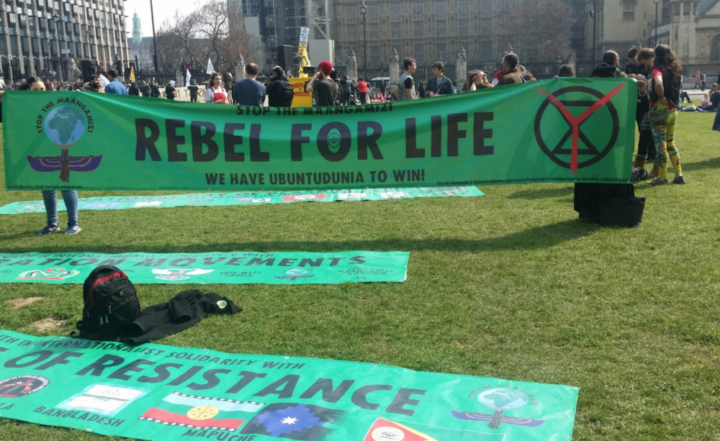Extinction Rebellion Internationalist Solidarity Network is joining with Stop the Maangamizi and African Emancipation Day Reparations March to lock down Brixton Road on Saturday 1 August.
We’ve been doing all the nice stuff for six years – going on annual marches and delivering letters calling for the UK Government to establish an All-Party Parliamentary Commission of Inquiry for Truth & Reparatory Justice.
But we’ve been ignored by the government, who it seems will not act without compulsion. This year we have decided to up the challenge by engaging in peaceful civil disobedience to make our call for reparations heard, and now in the context of the climate and ecological emergency we make this call for our very survival.
On Saturday 1 August we will close off a section of Brixton Road from Windrush Square to Max Roach Park and transform Brixton into a public action-learning space.
Repair
When most people hear the word ‘reparations’ what they think of is compensation, but that’s only a small part of what the term actually means. Reparations means repair, it means new economic systems that don’t produce and reproduce inequality, not just a compensation patch-up job.
In Brixton on Saturday we will block the road, reducing the usual levels of air pollution from vehicles passing through Brixton and providing a space for the community to come together without a detrimental impact to their health.
According to the Nigerian critic, essayist, poet, and journalist Professor Chinweizu, the key to reparations is the possibility it offers Black people for the rehabilitation of themselves, families, communities, but first and foremost the rehabilitation of their minds, as well as the rehabilitation of those in the oppressor role – a kind of joint emancipation.
The reparations framework is really a system change framework because it asks for a resolution that addresses the root cause.
A coalition of groups is coming together to take action, including Stop the Maangamizi Campaign, the Afrikan Emancipation Day Reparations March Committee, Rhodes Must Fall Oxford, A Tribe Named Athari, Extinction Rebellion and XR UK Internationalist Solidarity Network (XRISN).
Solidarity
XRISN formed in early 2019, led by myself and other members of the Stop the Maangamizi Campaign, though we had been in talks with the founders of Extinction Rebellion since before its launch in October 2018. The group formed out of the need for a space for forming different perspectives on rebellion to broaden out from the global north positionality of the founders of XR.
We in Stop the Maangamizi had connections into communities that could strengthen what XR was doing, drawing on the centuries of experience of rebellion.
We have since worked to form three global south affinity networks, the XR Affinity All-Afrikan Network (XRAAN) based in Accra, Ghana, the XR Affinity Network of Asia (XRANA), based in Delhi, India, and the XR Affinity Network of South Abya Yala (XRRAAYS), based in Colombia, Abya Yala (also known as the Americas).
We are not going to these places and saying to people you have to be XR to belong to this network, instead we are facilitating a process of mutual solidarity and learning between XR and established rebellions around the world.
XRISN supports these networks and amplifies their voices within the XR movement, to ensure that the rebellion is planned, organised and carried out with the thinking of communities in the global south and the diaspora. We also support them in terms of infrastructure and secure communications, knowing activists in many of these places are routinely persecuted and murdered for the work that they do.
Harm
XR has supported this global south led solidarity network with 20 percent of revenue from crowd funders going to XRISN as an act of solidarity and reparation baked into what they do.
The same process is at work between ISN and the wider XR movement – we promote the notion of planet repairs which has been adopted by some parts of XR.
In turn, XR has been a helpful model for us to point to in our communities as we try to make the argument for taking direct action. Even though organised nonviolent civil disobedience is part of our histories, it is something we have drifted away from in the Global North, and XR gives people a contemporary example of how civil disobedience can shift the window of possibility in society.
So what does reparations have to do with the climate and ecological emergency?
Part of how we repair historic harm is by changing it legacies in the present – for example, by stopping extractivism, or using non-violent direct action to challenge the corporatocracy. Only when you have stopped the harm can you effectively think about at what repair looks like.
Restitution
Another element of reparations under international law is restitution – what do you need to repair or renew in terms of how Indigenous people relate to the land? This involves the restoration of sovereignty and enabling Indigenous people to become guardians of the land once again.
A third aspect of reparations is rehabilitation – people focussed capacity building and knowledge development – looking at the best that we can be with all the different knowledge systems.
In different parts of humanity there are pockets of the answer. And then there is the notion of compensation, but that is only one part of reparations. For instance, the inequality of carbon footprints and burden of ecological debt are beyond money and beyond compensation.
Ultimately as Afrikan ethicist Professor Maulana Karenga states, reparations are a process of repairing and remaking a people who are in the process and practice of repairing, renewing and remaking the World.
This Author
Esther Stanford-Xosei is a reparationist and co-founder of Extinction Rebellion Internationalist Network. As a ‘new abolitionist’, Esther serves as the co-vice chair of the Pan-Afrikan Reparations Coalition in Europe (PARCOE). She is also the co-initiator of the Stop the Maangamizi campaign and official spokesperson for the Afrikan Emancipation Day Reparations March Committee.






